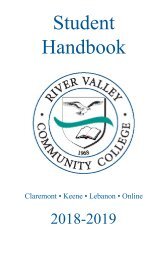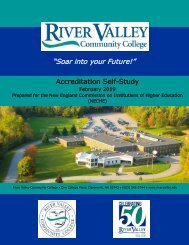- Page 1 and 2:
“Soar into your Future!” Accred
- Page 3 and 4:
Table of Contents INSTITUTIONAL CHA
- Page 5 and 6:
at least two but less than four yea
- Page 7 and 8:
Physical Therapy Assistant Radiolog
- Page 9 and 10:
a) Organization of academic affairs
- Page 11 and 12:
ORGANIZATIONAL CHARTS x | P a g e
- Page 13 and 14:
xii | P a g e
- Page 15 and 16:
xiv | P a g e
- Page 17 and 18:
xvi | P a g e
- Page 19 and 20:
xviii | P a g e
- Page 21 and 22:
xx | P a g e
- Page 23 and 24:
xxii | P a g e
- Page 25 and 26:
TABLE OF CIHE ACTIONS, ITEMS OF SPE
- Page 27 and 28:
INTRODUCTION River Valley Community
- Page 29 and 30:
RVCC STANDARD COMMITTEES Committee
- Page 31 and 32:
A recurring theme discussed through
- Page 33 and 34:
DATA FIRST FORMS GENERAL INFORMATIO
- Page 35 and 36:
Description Mission Statement: Rive
- Page 37 and 38:
Through our workforce development o
- Page 39 and 40:
Standard 1: Mission and Purposes At
- Page 41 and 42:
Description Planning and evaluation
- Page 43 and 44:
Committees for each Initiative met
- Page 45 and 46:
of the project, and the continued a
- Page 47 and 48:
oards and clinical/practicum precep
- Page 49 and 50:
necessary, guide a suspension or cl
- Page 51 and 52:
Standard 2: Planning and Evaluation
- Page 53 and 54:
Standard Three Organization & Gover
- Page 55 and 56:
Two (2) members from building/mecha
- Page 57 and 58:
Institutional Organization River Va
- Page 59 and 60:
challenges in financial stability r
- Page 61 and 62:
Standard 3: Organization and Govern
- Page 63 and 64:
37 | P a g e Standard Four The Acad
- Page 65 and 66:
progress through the program; and t
- Page 67 and 68:
All programs at RVCC strive to foll
- Page 69 and 70:
One area that came to light during
- Page 71 and 72:
All program curricula, as well as c
- Page 73 and 74:
the College. Faculty mentors often
- Page 75 and 76:
in the face to face format and are
- Page 77 and 78:
Standard 4: The Academic Program (S
- Page 79 and 80:
Standard 4: The Academic Program (H
- Page 81 and 82:
Standard 4: The Academic Program (H
- Page 83 and 84:
Standard 4: The Academic Program (C
- Page 85 and 86:
Description River Valley Community
- Page 87 and 88:
RVCC students who are 25 and over m
- Page 89 and 90:
Student Readiness for College The S
- Page 91 and 92:
The College, under the direction of
- Page 93 and 94:
Academic Advising All Program Direc
- Page 95 and 96:
In Fall of 2018, a group of student
- Page 97 and 98:
Strong community partnerships provi
- Page 99 and 100:
Standard 5: Students (Enrollment, F
- Page 101 and 102:
Undergraduate Admissions informatio
- Page 103 and 104:
Description River Valley Community
- Page 105 and 106:
While slightly increased over previ
- Page 107 and 108:
accrediting body. Many accrediting
- Page 109 and 110:
As per the full-time faculty’s CB
- Page 111 and 112:
There is a standard process that RV
- Page 113 and 114:
September of 2018 and the OTA progr
- Page 115 and 116:
mode of delivery when there is a ne
- Page 117 and 118:
Policies also exist to support form
- Page 119 and 120:
Standard 6: Teaching, Learning, and
- Page 121 and 122:
Standard 6: Teaching, Learning, and
- Page 123 and 124:
97 | P a g e Standard Seven Institu
- Page 125 and 126:
Gov. Grants $ 300,404 $ 1,389,296 $
- Page 127 and 128:
system of public community college
- Page 129 and 130:
udget for this program was increase
- Page 131 and 132:
CCSNH began a five-year budget mode
- Page 133 and 134:
een, or are being resolved. A CCSNH
- Page 135 and 136:
The RVCC IT Department has a studen
- Page 137 and 138:
Fiscal Year ends - month & day: (06
- Page 139 and 140:
FISCAL YEAR ENDS month & day ( / )
- Page 141 and 142:
FISCAL YEAR ENDS month & day ( 06 /
- Page 143 and 144:
Standard 7: Institutional Resources
- Page 145 and 146:
Standard Eight Educational Effectiv
- Page 147 and 148:
College, 88% (754) of the students
- Page 149 and 150:
Figure 8.2 - RVCC Student Transfer
- Page 151 and 152:
to ensure students were provided st
- Page 153 and 154:
(https://www.turningpointsnetwork.o
- Page 155 and 156:
Figure 8.5 - RVCC Program Completer
- Page 157 and 158:
new Clinical Coordinator was hired.
- Page 159 and 160:
Bachelor Cohort Entering Associate
- Page 161 and 162:
Student Success Measures/ Prior Per
- Page 163 and 164:
Description River Valley Community
- Page 165 and 166:
Policy, the Domestic Violence in th
- Page 167 and 168:
Hampshire as a self-governing body
- Page 169 and 170:
esponsibilities of both students an
- Page 171 and 172:
Projections By Fall of 2019, Col
- Page 173 and 174:
Advancement not avail. http://www.r
- Page 175 and 176:
Standard 9: Integrity, Transparency
- Page 177 and 178:
Programs, courses, services, and pe
- Page 179 and 180:
Print Publications Self-study/ Fift
- Page 181 and 182:
(1) (2) (3) (4) (5) CATEGORY Where
- Page 183 and 184:
with college level math course. 5.B
- Page 185 and 186: continuingaccreditation offered at
- Page 187 and 188: 27. Respiratory Therapy, AS https:/
- Page 189 and 190: 4.12 Learning activities & instruct
- Page 191 and 192: Progress Report (to be submitted on
- Page 193 and 194: E-SERIES FORMS: MAKING ASSESSMENT M
- Page 195 and 196: Management Letter & Financial Repor
- Page 197 and 198: We have evaluated the key factors a
- Page 199 and 200: did not identify any deficiencies i
- Page 201 and 202: Table of Contents INDEPENDENT AUDIT
- Page 203 and 204: Bangor, Maine December 7, 2018 INTR
- Page 205 and 206: CCSNH has done an excellent job ens
- Page 207 and 208: CCSNH continues to see declines in
- Page 209 and 210: CCSNH, however, has one of the stro
- Page 211 and 212: As for wage gaps, across all age gr
- Page 213 and 214: FINANCIAL STATEMENTS CCSNH reports
- Page 215 and 216: Capital assets, net of accumulated
- Page 217 and 218: Net position Overall net position d
- Page 219 and 220: 193 | P a g e
- Page 221 and 222: Net position, beginning of year, as
- Page 223 and 224: 218 | P a g e
- Page 225 and 226: and the recognition of a gain of $2
- Page 227 and 228: Noncurrent assets Student loans rec
- Page 229 and 230: Appropriations from the State of Ne
- Page 231 and 232: Nature of Business The Community Co
- Page 233 and 234: When capital assets are retired or
- Page 235: inflows and deferred outflows relat
- Page 239 and 240: 5. Long-Term Liabilities Changes in
- Page 241 and 242: 6. Bonds Payable Bonds payable cons
- Page 243 and 244: 7. Defined Benefit Pension Plan CCS
- Page 245 and 246: Amounts reported as deferred outflo
- Page 247 and 248: Discount Rate The discount rate use
- Page 249 and 250: At June 30, 2018, CCSNH reported de
- Page 251 and 252: Discount Rate The discount rate use
- Page 253 and 254: Amounts reported as deferred outflo
- Page 255 and 256: Sensitivity Analysis The following
- Page 257 and 258: Investments Fair Value Measurement
- Page 259 and 260: CCSNH has not defined a limit in it
- Page 261 and 262: 256 | P a g e REQUIRED SUPPLEMENTAR
- Page 263 and 264: Notes to the Required Supplementary
- Page 265 and 266: Schedule of Collective Net OPEB Lia
- Page 267: Graduate Surveys List of new and el





